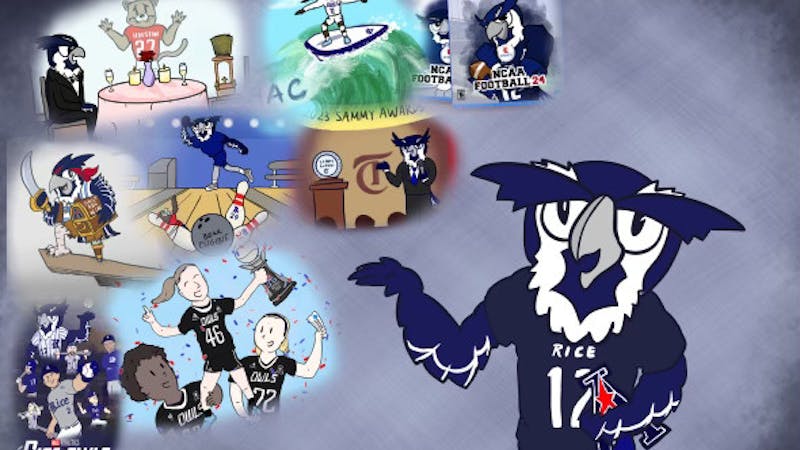The Fifth Quarter: In college athletics and life, money talks
This past year, Missouri has become a hotbed of racial tensions. Amid seemingly countless controversies and racial lines being formed, the state has become the center of a growing national concern. The issue has spread across college campuses across the country, including right here at Rice. It has moved to the forefront of issues in Missouri, and it has become unavoidable. The sports world is no exception.
Over the weekend, black players on the University of Missouri football team threatened to boycott playing until university President Tim Wolfe stepped down. Wolfe was accused of avoiding comment or action regarding the racial tensions Missouri has faced recently. Specifically, protesters were upset with how he reacted, or rather didn’t react, to racially charged incidents on campus and his refusal to appropriately acknowledge protests. Eventually, Wolfe and university Chancellor R. Bowen Loftin stepped down amid the controversy.
White and black players alike joined in the strike and threatened to end Missouri’s season early. Had Wolfe not stepped down, Missouri would have had to directly pay Brigham Young University, the next opponent on the Tigers’ schedule, $1 million in compensation for canceling the game. That financial loss does not include the revenue the university would have pulled in from television and other sources.
The football team’s victory in forcing Wolfe’s resignation showcases an issue with college athletics that goes beyond racial boundaries. These athletes, these unpaid athletes, can bring in huge profits for their universities without ever seeing a dime of their contributions.
This issue has been discussed and debated at length, but this particular event has the opportunity to revolutionize how we view college sports.
Missouri’s players, whether realizing it or not, unionized to create change. Their unionization had such a tremendous impact on the university that the president had no choice but to listen to the demands of a varsity sports team. Consider the magnitude of the act: College athletes have the power to change their university from the top down.
Just how much influence these events will have remains to be seen. If other teams in the future decide to sit out, who knows what demands they could make. The athletes bring in so much revenue that universities have no choice but to listen to them. Football, and to a lesser extent basketball, teams have the potential to hold a great deal of financial power over university administrations. What makes it more impressive is that protesters and social activists have been calling for Wolfe’s resignation since summer. It was only until this much money was involved that real change happened.
Naturally, there are limits. These kinds of influences can only really happen at large Power 5 schools where football teams make profits. Only 20 Division 1 athletic departments profited in 2013; 103 schools lost money from athletics. Regardless, a team’s ability to sit out games and force their school to pay fines is a substantial power move that athletes can use to their advantage.
I do not believe, however, that strikes and boycotts will become a regular thing. Most athletes want to play and realize they have been given a scholarship to do just that. Missouri, however, saw a perfect storm of geographic, financial and athletic circumstances to encourage the weekend’s events. The football program nets roughly $3 million in revenue each season, adding to its financial power. Additionally, the team is currently sitting at 4-5 with its postseason hopes looking bleak.
The issue is not very clear cut, either. According to an anonymous Missouri player, the team’s decision was not unanimous, and only occurred because of the team’s disappointing season.
“As much as we want to say everyone is united, half the team and coaches — black and white — are pissed,” the athlete told ESPN’s Brett McMurphy on Nov. 8. “If we were 9-0, this wouldn’t be happening.”
The issue speaks to the incredible power college football has over universities and the sports world. It also speaks to the importance of winning in modern athletics. Social change can be instituted by these boycotts, but not at the expense of winning. Too much money is on the line.
Once again, college athletics has shown the foothold it has over administrations. While Missouri’s boycott ultimately proved successful, we once again learned an important lesson about college athletics and, indeed, the world: Money talks.
Evan Neustater is a McMurtry College junior and Thresher Sports Editor.
More from The Rice Thresher

MMA and milk miles: Rice students engage with sports
It’s not uncommon to find yourself walking to Reckling Park to watch the baseball team or to the recreational fields to play soccer. However, Division I and intramural sports are only a sliver of what the greater Rice community takes part in. From cricket to mixed martial arts to milk miles (yes, milk miles), students engage in a variety of sports that are a testament to their past pastimes, new endeavors and the need to destress.

Reflecting on four years: a heartfelt farewell to the Thresher
As I sit down to write this farewell column, I can’t help but feel a whirlwind of emotions swirling within me. It feels like just yesterday that I nervously clicked the “Join Meeting” button on Zoom in early August of my freshman year to express my interest in joining the sports section of the Rice Thresher. Daniel Schrager and Ben Baker-Katz, the sports editors in my freshman year, welcomed me with open arms, encouraging me to write for the Thresher. Little did I know that this initial encounter would mark the beginning of an incredible journey that has shaped my college experience in ways I could have never imagined.


Please note All comments are eligible for publication by The Rice Thresher.